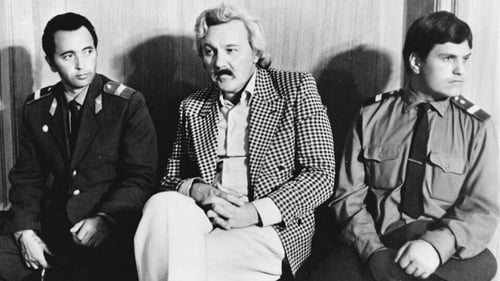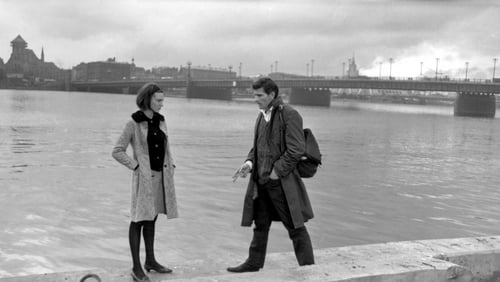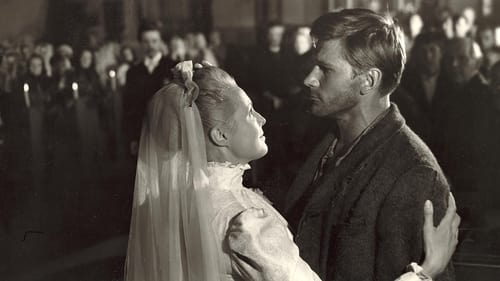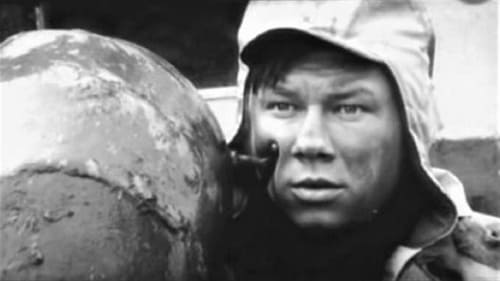
Uldis Pūcītis
출생 : 1937-04-15,
사망 : 2000-12-14
약력
Uldis Pūcītis (15 April 1937 – 14 December 2000) was a Latvian television, theater and film actor, scriptwriter and film director.
Uldis Pūcītis was born in Ranka parish, Gulbene District to Jānis Pūcītis and his wife Anna Pūcīte. After graduating from school in Ranka he continued his studies in Riga and studied at the Latvian State Conservatory, graduating in 1959. Following his graduation, he worked as schoolteacher in the town of Aizpute for four years while engaged at the Liepāja Theater from 1960 to 1972, the Dailes Theater from 1964 to 1973 and the Youth Theatre from 1962 to 1964 and again from 1973 until 1992.
Pūcītis made his film debut in a small role as a fisherman in the 1959 Ada Neretniece-directed Latvian language Soviet film Svešiniece ciemā (English release title: Stranger in the Village) before his first starring role opposite Latvian actress Vija Artmane in the Leonīds Leimanis-directed period-drama Purva bridējs, a film adaptation of the novel of the same name by Latvian writer Rūdolfs Blaumanis. He would go on to appear in a number of film and television roles throughout the 1960s and into the 1990s, as well as continuing his stage career.
In 1998, Pūcītis would write the script and co-direct the television mini-series Izpostītā ligzda for Latvijas Televīzija (LTV) with Armands Zvirbulis. The film and both Zvirbulis and Pūcītis would be awarded the Lielais Kristaps; the highest prize awarded for Latvian cinema.
Pūcītis was married to Olīvija Pūcīte (née Poselanova). Their daughter is actress Milēna Gulbe-Kavace, and grandson is professional tennis player Ernests Gulbis. In late 2000, Pūcītis fell ill at his summer home in Jūrmala. After being taken to the hospital in Riga, he was initially diagnosed with a stomach ulcer. However, he died in hospital of a pulmonary embolism and was buried at the Riga Forest Cemetery.

Writer
A family drama.

Director
A family drama.

Fairytale of the the good girl and the bad girl, who gets the prince?

A meditation on Henrik Ibsen's plays "Brand" and "Peer Gynt".

Vējš

A film based on novels by Latvian writer Andrejs Upīts tells a story about Latvian peasants around the 16th/17th century when they were under the role of several other countries.

Insp. Peter Glebsky
The police get a call-out to a lonely hotel in the Alps. When an officer gets to the hotel everything seems to be alright. Suddenly, an avalanche cuts them off from the rest of the world and strange things start happening.

Intelligence-diversionary group of athletes who know how to shoot snipers, run, jump, feel free in the water and under water, to withstand the monstrous load of hand-to-hand fights, will be able to reach the goal only going together, passing the task as a relay. Seven of them. Among them is a girl swimmer. It will be the most difficult, the last stage of the journey. The plot is based on the real facts of the great Patriotic war.

Zigurds
Based on a story by Janis Lapsa, written by Janis Lapsa and Andris Kolbergs, film is a singular work, filled with human warmth. It is a story about a talented surgeon Markalns, who after a serious personal crisis, returns to his native town in order to start his life anew. The attention is concentrated on the inner world of Markalns, his feelings in this so important period of his life, when to endure and to proceed means to regain the lost sense of life and himself. His character and emotional world opens in a wide scale: in collisions with colleagues, patients, friends, himself. He is contradictory, but even in moments of low spirits, virile. A real warmth and balance of mind is brought in the life of the outwardly robust and clumsy surgeon by a shy small-town girl Irita, called Doggie.

Petak
Voldis Viters is released after seven years in prison. He is 46 years old and has no family or job. Some of his old friends have abandoned the life of crime, and policeman Leo Aleksandrs, as well as the beautiful taxi driver Irēna, try to persuade Voldis to forget the past and move on. But when the crime boss Teksis proposes a plan to rob a jewelry store, Voldis agrees, thinking this will be his last crime before starting a new life. Marking the pinnacle of its director's filmography, To Be Unwanted is a psychological drama that centers not on a single crime or its investigation but on the emotional collapse of the criminal as he realizes that his amoral lifestyle has rendered him redundant within society.

Yanis Krastins
Successful work and life of a brave militia captain who does not know much about human psychology.

Jānis
A load of gold is stolen. Detectives make criminals play by their rules.

Rein
Reet loves her long-distance coxswain husband Reinu, but the long separations have tortured her. It seems to her that the man cares more about his work than about her. Rein really loves his work, but his wife just as passionately. He does not understand how loneliness can overwhelm Reet, when women have always been waiting for men from far away. Their family friend Mart loves Reet and cannot see her suffer. It is in Marti's power to offer Reet a safe life, and the woman plagued by internal struggles makes a choice, but happiness seems to slip even further away.

During WWII Red Army sailor suddenly gets to German underwater swimmers secret base...

The Second World War has just ended, but national partisans are still hiding in Latvia's forests and fighting against the Soviet regime. Ansis Leinasars, who has been tasked to spark a coup in Latvia, arrives by night from across the sea, but his work is hampered at every step. His last hope is a meeting with the partisans in a church...

A young boy finds a watch with an engraving in Spanish saying that the watch belongs to Captain Enrico, and adventures begin...

Cēzars
Cezars Kalnins, portrayed by "Latvian Harrison Ford” Uldis Pucitis, installs telephones by day and composes pop songs by night. The puritan Soviet censorship deems Cezars’s lyrics "unsuitable and frivolous” and "unfit for the Soviet youth”. In fact, it can be argued that this assessment matches the opinion of the Soviet cinema authorities in regard to this film as a whole, since "Four White Shirts” was immediately banned and released in cinemas only in 1986. The creative boldness and stubbornness, evident in both Cezars’s bitingly ironic verses and the film’s unconventional narrative structure and fresh, new-wave-inspired mode of expression, turned out to be equally problematic for the hero and for the film itself, as well as for its director whose representation of the actual mechanisms of Soviet censorship ended up too realistic for his own good.

Edgars
In this film, set in Latvia in the late 19th century, Edgars, the coachman of Alaine Manor, loves Kristine, the washerwoman's daughter, although he is too hot-headed for Kristine's mother to consider him a good suitor for his daughter. The servant Viskrelis and stable boy Sutka try to tempt Edgars to a life of drinking and a relationship with the barmaid Matilde. Meanwhile, Kristine is courted by the rich land owner, Akmentins.

Alfons
During World War II three best friends are mobilized into the Waffen-SS Latvian Legion. Years later their fates continue to intertwine, as memories of war loom in back of their minds.

A young girl is puzzled when she has to choose a husband. She cannot decide whether to marry her childhood friend or a recently met nouveau riche.















